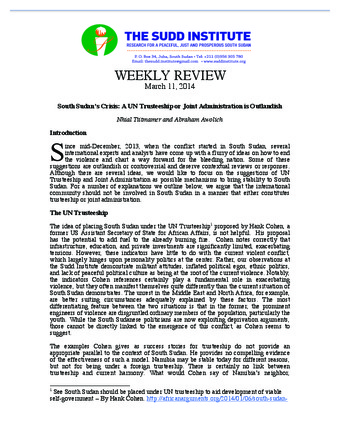South Sudan’s Crisis: A UN Trusteeship or Joint Administration is Outlandish

Authors: Abraham Awolich, Nhial Tiitmamer
Organization: The Sudd Institute
Type: Weekly Reviews
Date: 11/03/2014
Publication Summary
Since mid-December, 2013, when the conflict started in South Sudan, several international experts and analysts have come up with a flurry of ideas on how to end the violence and chart a way forward for the bleeding nation. Some of these suggestions are outlandish or controversial and deserve contextual reviews or responses. Although there are several ideas, we would like to focus on the suggestions of UN Trusteeship and Joint Administration as possible mechanisms to bring stability to South Sudan. For a number of explanations we outline below, we argue that the international community should not be involved in South Sudan in a manner that either constitutes trusteeship or joint administration.
Abraham Awolich is the former Managing Director of the Sudd Institute. Awolich’s research has focused on management of development organizations working in conflict mitigation, governance and business management. Awolich is the co-founder of the Sudan Development Foundation and the former Executive Director of New Sudan Education Initiative (NESEI). Previous to joining the Sudd Institute, Awolich helped establish a secondary school in Yei and a medical clinic in Kalthok, Awerial County. Awolich has a Master’s Degree in Pubic Administration from the Maxwell School of Citizenship and Public Affairs at Syracuse University and Bachelor’s Degree from the University of Vermont in Anthropology and Business Administration. Awolich is a McNair Scholar and winner of the prestigious Samuel Huntington Public Service Award in 2006.
Nhial Tiitmamer has served as the Director of the Environment and Natural Resources Program at The Sudd Institute where he is currently on leave to work with United Nations in South Sudan (UNMISS). He has served as an Adjunct Assistant Professor at the University of Juba where he has taught Environmental Economics, Natural Resources Economics and Environmental Sociology. Between November 2021 and November 2022, Nhial worked as Senior Environment Associate with the United Nations High Commissioner for Refugees (UNHCR) in Juba. Before returning from Canada in 2013, Nhial worked at Arletta Environmental Consulting in Calgary and at University of Alberta’s Augustana Campus in Camrose in Alberta, Canada. Nhial’s research focusses on natural resources governance, environmental protection, climate change, and sustainable energy. He was awarded in May 2023 by the Board of Directors of The Sudd Institute with Research Impact Award for policy impacts. Nhial holds a B.A. in Environmental Studies with a minor in English Literature from the University of Alberta and an M.Sc. in Sustainable Energy Development from the University of Calgary in Alberta, Canada.
